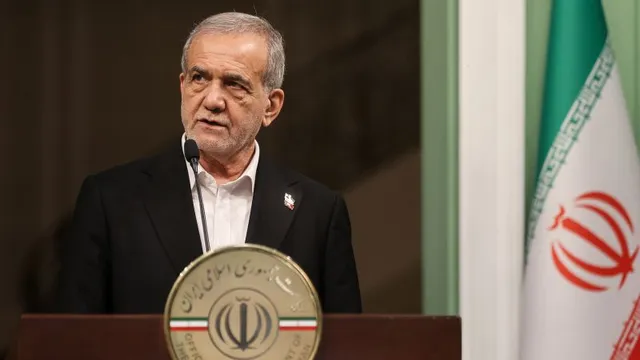
Trump confirms Iran's agreement to nuclear deal terms
2025-05-17 09:03- President Trump announced in Doha that serious negotiations for a nuclear deal with Iran are ongoing.
- Iran's willingness to compromise on its nuclear program may lead to sanctions relief and changes in global oil supply.
- Success in negotiations could reshape geopolitical dynamics and stabilize oil markets.
Express your sentiment!
Insights
In recent discussions, U.S. President Donald Trump expressed that the U.S. is on the verge of finalizing a nuclear deal with Iran, highlighting that Tehran has 'sort of' agreed to the terms set by Washington in exchange for sanctions relief. During his remarks in Doha, Qatar on May 16, 2025, Trump asserted that negotiations have been serious and fruitful, emphasizing the need for Iran to abandon any plans for nuclear weapons. An Iranian advisor indicated Tehran's willingness to conform to specific terms regarding their nuclear program and allowed international oversight. If the deal is executed successfully, it could lead to the lifting of economic sanctions against Iran and the resumption of oil exports, significantly affecting global oil markets. The U.S. has insisted on the complete cessation of uranium enrichment, calling it non-negotiable, while Iran has maintained that its nuclear activities are solely for peaceful purposes. As negotiations progress, the reactions within the Middle East and among global oil markets are closely monitored, with fluctuating oil prices reflecting the uncertainty surrounding the potential deal. Both sides have agreed to continue discussions, anticipating further constructive talks in the future.
Contexts
The current status of US-Iran nuclear negotiations is complex, reflecting the intricate geopolitical dynamics and the historical context of both nations. Following the United States' withdrawal from the Joint Comprehensive Plan of Action (JCPOA) in May 2018, relations between the two countries deteriorated significantly. Subsequent sanctions imposed by the U.S. led to increased tensions, with Iran gradually stepping away from its commitments under the JCPOA. As of mid-2025, negotiations have not yielded a comprehensive resolution, although there have been various attempts to re-engage both diplomatically and through indirect talks facilitated by intermediaries. The changing political landscape both in the U.S. and Iran has influenced these negotiations, with leadership transitions and varying priorities complicating the dialogue. Recent efforts to revive discussions have included back-channel communications and negotiations over the economic benefits of rejoining the JCPOA. The Biden administration has indicated a willingness to return to the agreement, contingent upon Iran adhering to its nuclear commitments. However, Iran has called for substantial concessions before it is willing to negotiate, emphasizing the need for the U.S. to lift sanctions fully. This stalemate has resulted in an ongoing escalation of Iran's nuclear activities, with increased uranium enrichment levels reported beyond JCPOA limits, raising alarms internationally regarding potential military applications and nuclear proliferation risks. Furthermore, external factors, including regional conflicts and the influence of U.S. allies in the Middle East, play a significant role in shaping the negotiations. Countries such as Israel and Saudi Arabia have consistently voiced concerns over Iran's nuclear ambitions, pressuring the U.S. to adopt a more stringent approach. The geopolitical implications are far-reaching, as a failure to curb Iran's nuclear developments may lead to a nuclear arms race in the region, necessitating urgent diplomatic resolutions. As of now, the prospects for reaching a sustainable agreement remain uncertain. Analysts suggest that continued dialogue, albeit with a focus on mutual respect and understanding of security concerns, may pave the way for incremental steps toward de-escalation. The need for a comprehensive, multilateral framework that includes regional actors alongside the U.S. and Iran could enhance the chances of long-term stability in the negotiations. Ultimately, the ongoing talks will hinge on balancing national interests, security imperatives, and the shared goal of nuclear non-proliferation.